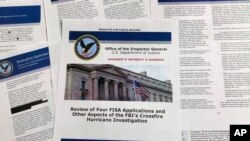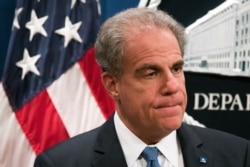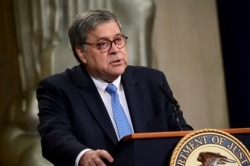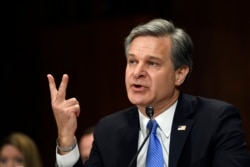The U.S. Justice Department's inspector general says in a new report the FBI was justified in opening an investigation in 2016 into suspected ties between U.S. President Donald Trump's election campaign and Russia, saying officials had enough evidence to authorize an inquiry.
The long-anticipated report released Monday contradicted some of Trump's and his Republican allies' most damning assertions about the investigation, such as the charge that senior FBI officials were motivated by political bias against Trump. The FBI investigation — dubbed Crossfire Hurricane — was subsequently taken over by special counsel Robert Mueller.
But the inspector general, Michael Horowitz, also sharply criticized the FBI for a series of "significant errors" in obtaining authorization from the Foreign Intelligence Surveillance Court to surveil Carter Page, a former Trump campaign adviser suspected of ties to Russian intelligence.
In one crucial omission, the FBI failed to disclose from the court and the Justice Department that Page had been approved as an "operational contact" for the CIA and had told the spy agency about his contacts with Russian intelligence officers, according to the report. However, the report said that the disclosure would not have prompted the court to reject the application.
Regardless, the investigation was launched months before the Page surveillance began and was based on well-founded suspicion about links between Trump campaign operatives and Russia, according to the report. The other Trump campaign associates investigated by the FBI were campaign chairman Paul Manafort, national security adviser Mike Flynn and foreign policy adviser George Papadopoulos.
"We ... concluded that … the FBI had an authorized purpose when it opened Crossfire Hurricane to obtain information about, or protect against, a national security threat or federal crime, even though the investigation also had the potential to impact constitutionally protected activity," Horowitz wrote in the 400-plus-page report.
The findings amount to a rejection of Trump's repeated claim that the FBI investigation was a political witch hunt to undo his presidency.
'Thinnest of suspicions'
Trump nonetheless asserted at the White House that the report confirmed an "attempted overthrow" of the government far worse than he had ever thought possible. "It is an embarrassment to our country, it is dishonest, it is everything that a lot of people thought it would be except far worse," he said.
The report also pitted the inspector general against Attorney General William Barr, to whom he reports.
Barr, who has been highly critical of the Russia investigation and ordered a separate internal probe into its origins, rejected the IG's finding that there was sufficient basis for opening the investigation. Barr put a different spin on the report's findings.
"The inspector general's conclusion now makes clear that the FBI launched an intrusive investigation of a U.S. presidential campaign on the thinnest of suspicions that, in my view, were insufficient to justify the steps taken," Barr said in a statement.
John Durham, the U.S. attorney leading the internal Justice Department probe, said he did not agree with the inspector general's conclusion about the legal basis of opening the investigation.
"Based on the evidence collected to date, and while our investigation is ongoing, last month we advised the Inspector General that we do not agree with some of the report's conclusions as to predication and how the FBI case was opened," Durham said in a statement.
FBI response
FBI Director Christopher Wray ordered a series of more than 40 corrective steps in response to the inspector general report.
"The FBI has some work to do and we are committed to building on the lessons we learn today to make sure that we can do better tomorrow," an FBI spokesperson said in a statement.
The FBI launched its investigation in July 2016 after receiving a tip that the Russian government was considering helping the Trump campaign by releasing damaging information about Democratic candidate Hillary Clinton in the form of thousands of emails stolen from the Democratic National Committee.
Papadopoulos made the claim to Australia's ambassador to the United Kingdom two months earlier, saying he had been given the information by a London-based professor with ties to the Kremlin. Papadopoulos has since claimed that the professor, Joseph Mifsud, was a Western asset and that he was set up. Mifsud has denied supplying the information.
The report looked into whether former FBI lawyer Lisa Page and former FBI agent Peter Strzok were motivated by anti-Trump bias to open the investigation. Page and Strzok, who had engaged in an affair, were removed from the investigation after they were discovered to have exchanged a series of anti-Trump text messages.
The report said that while Page was involved in some of the discussions about opening an investigation and Strzok had a decision-making role, the ultimate decision was made by Strzok's supervisor in consultation with top FBI leaders.
"We did not find documentary or testimonial evidence that political bias or improper motivation influenced his decision," Horowitz wrote.
Steele dossier
The report identified "at least 17 significant errors or omissions" in the FBI's four applications to obtain court authorization to monitor Page. Among them, the inspector general criticized the FBI for withholding information that Christopher Steele, a former British spy and author of a dossier about Trump, was not a credible source.
As part of its surveillance applications, the FBI submitted the Steele dossier, a compilation of unverified allegations about Trump's ties to Russia. The document had been prepared as opposition research for the Clinton campaign.
Trump and his Republican allies have seized on the FBI's reliance on the Steele dossier to allege the bureau abused its authority to illegally "spy" on the Trump campaign, an assertion that Barr echoed when he testified before Congress earlier this year.
"That so many basic and fundamental errors were made by three separate, hand-picked teams on one of the most sensitive FBI investigations that was briefed to the highest levels within the FBI, and that FBI officials expected would eventually be subjected to close scrutiny, raised significant questions regarding the FBI chain of command's management and supervision of the FISA process," the report states.
In a statement, Barr asserted that "FBI officials misled the FISA court, omitted critical exculpatory facts from their filings, and suppressed or ignored information negative the reliability of their principal source."
However, Paul Rosenzweig, a former federal prosecutor now with the R Street Institute in Washington, said the attorney general's critical take reflects Trump's wishes.
"In the end, the report will prove very little of the Republicans' conspiracy theories," said Rosenzweig. "It proves, however, that the FBI is an imperfect organization."







